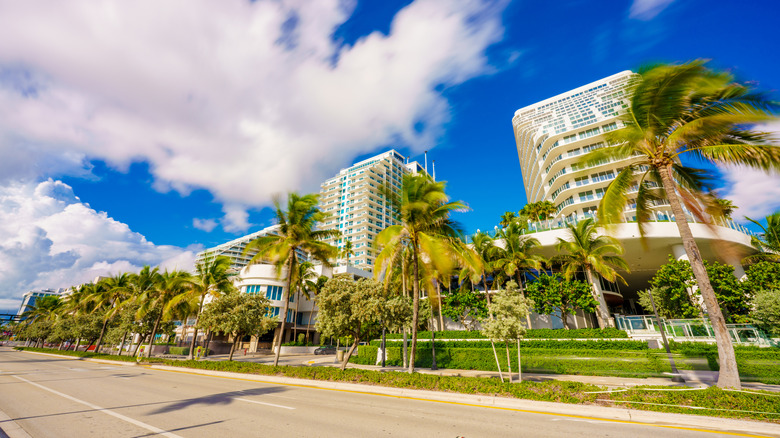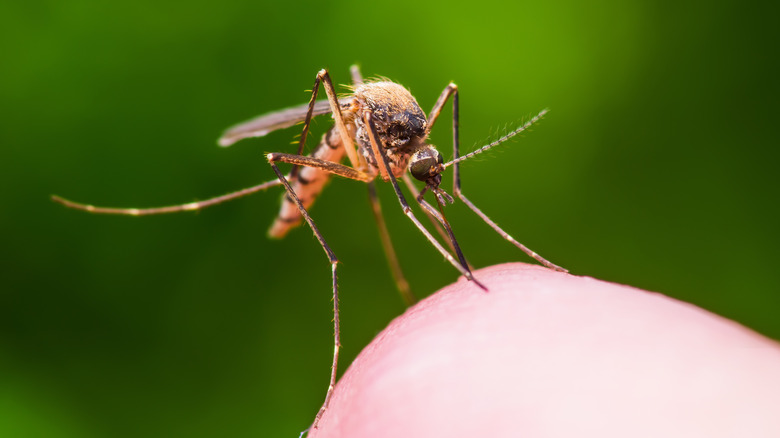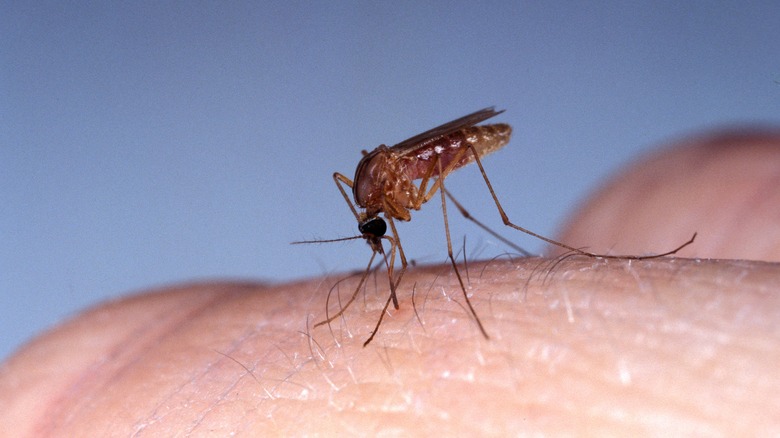The Itchy Reason Tourists May Want To Avoid Visiting Florida During This Time Of Year
If you're visiting Florida in July, August, or September, you might be able to escape the crowds by choosing a hidden gem like Hutchinson Island over Palm Beach, but you won't be able to escape the mosquitoes. Unfortunately, mosquitoes love warm tropical weather just as much as people do, so it's no surprise that in balmy summer, Florida is at the peak of mosquito season. When the warm rainy season comes, typically between May and October, mosquito eggs hatch in great numbers, releasing tons of bloodsucking insects into the state.
This is nothing new for the region. A letter documented by a missionary visiting Florida in the 16th century shows just how insufferable mosquitos can be. "He wrote back to his father superior that he would do anything to get out of this pestiferous place," Gordon Patterson, a professor at the Florida Institute of Technology and a mosquito history expert, told the Tampa Bay Times. "'Give me thieves, scoundrels, murderers, but these mosquitoes are more than I can tolerate,'" he said.
To this day, they remain a constant source of frustration for visitors in Florida, to the point that many tourists avoid the state when mosquitoes are bad. As described by entomologist Jonathan Day from the University of Florida's Medical Entomology Lab, Florida knows that keeping mosquitoes at bay is the only way to bring tourists into the state (via UF Health).
The threat of mosquito-borne illnesses in Florida
Sunburns and dangerous rip currents on Florida beaches aren't the only risks of your summer trip to the Sunshine State. The uncontrollable itching and unpleasant red welts are probably reason enough for tourists to avoid Florida in peak mosquito season, but there's another factor as well: disease. According to the Florida Department of Health, there are more than 80 types of mosquitoes in Florida, and some of them have the potential to make you very sick. They can carry diseases like dengue fever, Zika, West Nile, and St. Louis encephalitis. In July of 2023, it was reported that six people in Florida came down with malaria.
When disease outbreaks from mosquitoes in Florida rise, tourism to the area usually drops dramatically — and it makes sense. Obviously, nobody wants to go on vacation where they might contract a dangerous virus from an insect sucking their blood, and Florida knows it. As noted by UF Health, Florida pours $151 million dollars a year into curbing the mosquito population.
In addition to warning the public about potential diseases leading up to the hottest and wettest months of summer, Florida officials spray insecticides from helicopters. In 2021, the government went as far as to release hundreds of thousands of genetically modified non-biting mosquitoes into Florida to reduce the mosquito population, since the female version of the modified mosquitos cannot survive. Still, during the hottest months of the year, tourists are faced with swarms of mosquitoes.
Mosquito season might be getting longer
Whether you're looking to lounge in a resort in Palm Beach like a '60s socialite or relax in a charming small town like Cedar Key, if it's peak mosquito season, you're probably going to get a few bites. While typically, the worst time to be in Florida if you're worried about getting itchy red bumps has been July through September, as Florida becomes hotter due to reports of climate change, mosquitoes may be a bigger problem for a longer period of time.
In July of 2023, the Florida Department of Health from Monroe County reported that because it was hotter than ever in June and July, mosquito numbers were at an all-time high, and that locals and visitors alike would have to take precautions. That same year, the Florida news station WESH2 reported that between the heat and rain, conditions were ripe for mosquito season to continue into December.


